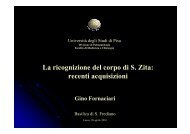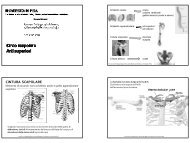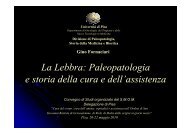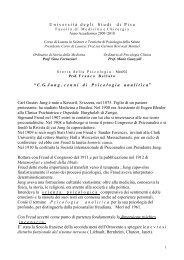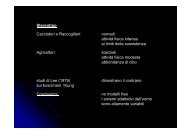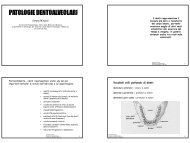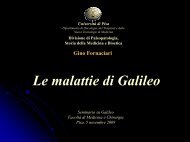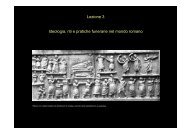Fondamenti della lingua inglese Laura Cignoni - Paleopatologia
Fondamenti della lingua inglese Laura Cignoni - Paleopatologia
Fondamenti della lingua inglese Laura Cignoni - Paleopatologia
You also want an ePaper? Increase the reach of your titles
YUMPU automatically turns print PDFs into web optimized ePapers that Google loves.
DISCORSO DIRETTO E INDIRETTO<br />
Direct and reported speech<br />
Ci sono due modi per riferire quello che una persona ha detto: frase diretta e frase indiretta.<br />
La frase diretta (direct speech) è quella in cui sono riportate le parole esatte pronunciate da una<br />
persona.<br />
“I’m going to the bookshop tomorrow”, said Gordon.<br />
La frase indiretta (indirect speech) è quella in cui si riferisce quanto detto da un’altra persona, senza<br />
necessariamente usare le parole esatte di chi le ha pronunciate.<br />
Gordon said he was going to the book shop the next day.<br />
Il passaggio dal discorso diretto a quello indiretto può richiedere delle modifiche nel tempo dei<br />
verbi, nei pronomi e negli avverbi di tempo.<br />
DISCORSO DIRETTO DISCORSO INDIRETTO<br />
I play (present simple) I played (past simple)<br />
I’m playing (present progressive) I was playing (past progressive)<br />
I played (past simple) I had played (past perfect)<br />
I have played (present perfect) I had played (past perfect)<br />
I will play (future) I would play (present conditional)<br />
I can play I could play<br />
I may play I might play<br />
I must play I had to play<br />
Il tempo del verbo non cambia nei seguenti casi:<br />
1) Se il verbo <strong>della</strong> frase diretta è un “past perfect”.<br />
“We had always liked the sea in winter”, she said.<br />
She said they had always liked the sea in winter.<br />
2) Se la frase diretta contiene uno dei seguenti verbi modali: would, might, could, should, ought to<br />
“You should buy that book “, he said.<br />
He said I should buy that book.<br />
3) Se quanto dichiarato è ancora vero.<br />
“I love the sea”, she said.<br />
She said she loves the sea.<br />
4) Se il “reporting” verb (verbo dichiarativo) è nel presente.<br />
59



